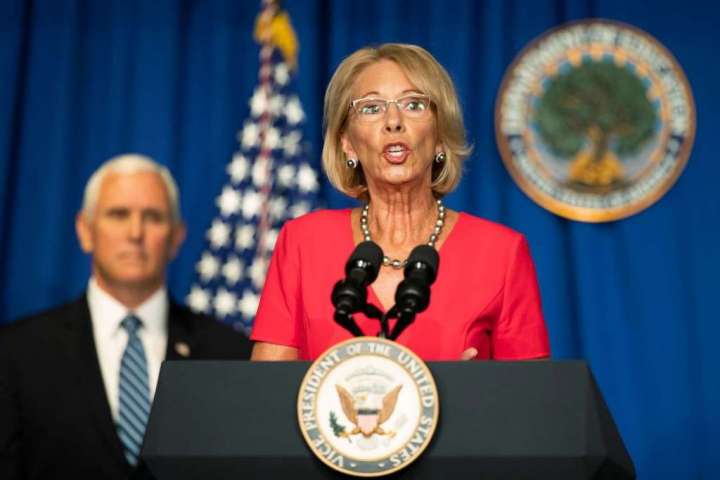Few talking points have been as politically fruitful for Donald Trump as calling every attempt to scrutinize him a “witch hunt.” It’s a convenient way to gloss over all the evidence of dubious and even potentially illegal activity. And it has worked even when a supposed “witch hunt” led to multiple criminal convictions, with watchdogs concluding there had been wrongdoing and — as notably as anything — lots of people close to Trump confirming they witnessed the sorcery firsthand.
Why the 25th Amendment and pardons loom large for Jan. 6 committee

All of which is to say: No matter what the Jan. 6 committee proves, it won’t be enough for certain people.
But looking the other way and pretending this is all one big nothingburger would certainly become much more difficult if the committee can demonstrate two things it played up in its first hearing last week:
- That members of Congress involved in trying to overturn the election sought pardons.
- That multiple members of Trump’s Cabinet considered invoking the 25th Amendment to remove Trump from office.
Though the committee has hinted that these questions will feature heavily in the coming days and weeks, the extent of its findings remains something of a black box. But if we learn that those involved in the election-overturning effort felt they had criminal liability, and that those closest to Trump considered such an extraordinary move, you simply cannot say this wasn’t worth a healthy and extraordinary investigation.
Rep. Liz Cheney (R-Wyo.) promised at Thursday’s hearing that evidence would soon be presented on both fronts.
On pardons, Cheney said: “As you will see, Representative [Scott] Perry [of Pennsylvania] contacted the White House in the weeks after January 6th to seek a presidential pardon. Multiple other Republican congressmen also sought presidential pardons for their roles in attempting to overturn the 2020 election.” (Perry has called this an “absolute, shameless and soulless lie.”)
On the 25th Amendment, Cheney said: “You will hear about members of the Trump Cabinet discussing the possibility of invoking the 25th Amendment and replacing the president of the United States.”
What we do know about these aspects of the investigation is piecemeal. As the New York Times recapped last week on the 25th Amendment, ABC News’s Jonathan Karl reported in his book that both Secretary of State Mike Pompeo and Treasury Secretary Steven Mnuchin discussed it. Pompeo denied having such a conversation, while Mnuchin has declined to comment.
But last week, Education Secretary Betsy DeVos confirmed that she, at least, was involved in such discussions. Per USA Today:
This was a major reason that before resigning, DeVos first wanted to know whether invoking the 25th Amendment to remove Trump was a viable option. That Jan. 7, she spoke with other Cabinet members to gauge their thoughts — and she also talked to [Vice President Mike] Pence, who’d have to be on board to remove the president.
“I spoke with the vice president and just let him know I was there to do whatever he wanted and needed me to do or help with, and he made it very clear that he was not going to go in that direction or that path,” DeVos says. “I spoke with colleagues. I wanted to get a better understanding of the law itself and see if it was applicable in this case. There were more than a few people who had those conversations internally.”
Once she understood that removing the president was pretty much impossible, DeVos resigned later in the day.
DeVos’s comments were overshadowed by the committee’s hearing that night, but right there is confirmation that some close to Trump were speaking in these terms. (And that’s on top of GOP House Minority Leader Kevin McCarthy having said he would ask Trump to resign.) We’ll find out more about how seriously the 25th Amendment was discussed, but the fact that it was discussed at all — and that DeVos has decided to disclose that, even belatedly — underscores the severity of the situation and how those closest to Trump at the highest levels interpreted it.
As for pardons, we know even less. The committee in a letter last month obliquely said that evidence from “former White House personnel has identified an effort by certain House Republicans after January 6th to seek a presidential pardon” for actions related to overturning the election. The committee cited Rep. Andy Biggs (R-Ariz.) as “a potential participant in that effort.” (Biggs declined to comment.)
The committee didn’t allude to such an effort in its letter late last year, seeking Perry’s testimony, but that letter came early in its investigation. And Perry is the one Cheney chose to single out at Thursday’s hearing. That might suggest the committee sees evidence involving him as being particularly compelling, or it could reflect that Perry was more central to the plot to overturn the election. (He has certainly figured more prominently in the known evidence, including in efforts to install Jeffrey Clark as acting attorney general.)
Ultimately, what we have are two crucial questions — which become more crucial given the denials by Pompeo and Perry. If these things happened and they falsely denied it, that would only reinforce the sense that a coverup occurred.
If the committee backs up its assertions — as DeVos now has in the case of the 25th Amendment — it would reinforce a conclusion that those involved in the effort to overturn the election knew that what they were up to might be illegal, and that those around the president knew his actions were as dangerous and anti-democratic as they appeared.
What would be the defense then? Perhaps it will be that these Cabinet officials were acting as part of the “deep state.” Perhaps it would be that the lawmakers were only trying to insulate themselves from being implicated in the next “witch hunt.” But at some point, the fact that this kind of thing has happened repeatedly might point in a different direction.






